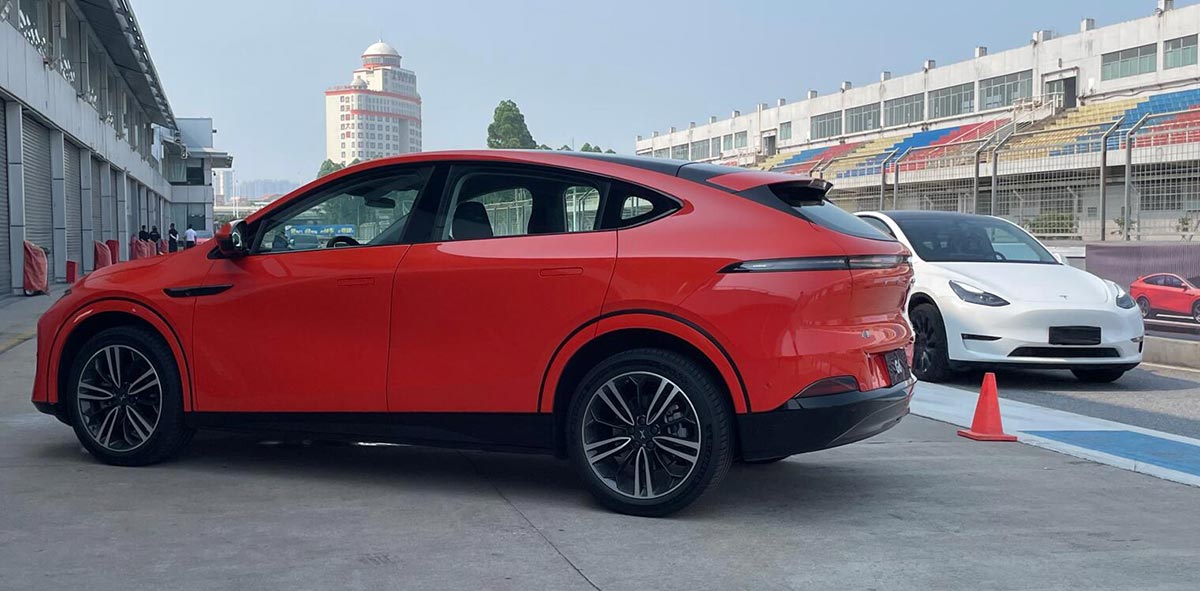Insights from Recent Survey Shed Light on Xpeng G6’s Customer Demographics
Approximately 29% of Xpeng G6 owners conducted a comparison between the car and the Tesla Model Y, while 9% made a comparison with the Nio ES6 during their car purchase decision.
On June 29, Xpeng (NYSE: XPEV) successfully launched the G6 model in China, marking the commencement of deliveries on July 10.

The introduction of the SUV played a pivotal role in revitalizing Xpeng’s sales performance. An ongoing survey has now shed light on the primary competitors of the G6 and the typical owner profile.
Among the initial group of G6 owners, a survey conducted by local consultancy firm Land Roads revealed that 29% of respondents cited the Tesla (NASDAQ: TSLA) Model Y as their main comparison during the purchase process.
The survey was carried out in August and targeted G6 customers across 33 cities who had either received their deliveries or had confirmed orders. The sample size was validated at 102 respondents.
Xpeng had earlier stressed the Model Y as the G6’s most direct rival, although the G6 comes at a lower price point than Tesla’s SUV.
Presently, the G6 is available in five configurations with initial prices ranging from RMB 209,900 ($28,820) to RMB 276,900. The Model Y, on the other hand, comes in three versions in China, with starting prices of RMB 263,900, RMB 299,900, and RMB 349,900, respectively.
The decision to opt for the G6 over the Model Y was primarily rooted in factors such as its advanced cabin features, comfort, interior quality, driver assistance capabilities, and purchase cost.
Beyond the Model Y, the second-most referenced option among G6 buyers was Nio’s (NYSE: NIO) ES6 SUV, with 9% indicating such a comparison at the time of purchase.
The new ES6 was launched on May 24 and enters the market with a base price of RMB 338,000.
During the car selection process, 8% of G6 owners considered Zeekr’s Zeekr 001 shooting brake, 6% deliberated on BYD’s Han EV, and 5% explored Deepal’s S7.
A uniform 4% of G6 owners compared the Zeekr X, Nio ET5, and Tesla Model 3.
The earliest G6 adopters have an average age of 32.6 years. Among them, the 26 to 30-year-old bracket accounts for the largest share at 36%, as outlined by Land Roads’ findings.
The majority of G6 owners, around 75%, are married. Of these, 30% have no children, 33% have children aged between 0 and 6 years old, and 30% have children in primary school.
Furthermore, 87% of these owners hold at least a bachelor’s degree, while 27% have pursued a master’s or doctoral degree.
Scrutinizing the occupations of G6 owners, 27% are engaged in the information technology, computer, and software sector, 12% work in finance, and 11% are employed in manufacturing.
Out of the 102 owners surveyed, 48% were first-time car buyers, 27% were making an additional vehicle purchase, and 25% engaged in trade-ins.
For their households, 28% were newcomers to car ownership, 42% were expanding their vehicle collection, and 29% relied on trade-ins.
Among the households pursuing additional purchases and trade-ins, 40% had prior experience with Japanese automobile brands. In contrast, the combined ownership of BMW, Mercedes-Benz, and Audi amounted to 7%.
The average budget allocated by these owners for their purchase was RMB 252,000, with the largest proportion, 53%, falling within the RMB 250,000 to RMB 300,000 range.
The decision-making period for buying the car averaged around 2.3 months, with nearly half of respondents, around 50%, finalizing their decision within a month.
Of the various attributes offered by the G6, the XNGP assisted driving function emerged as the most significant driver of sales.
Out of the 102 surveyed owners, 87% highlighted XNGP as the most compelling selling point, while 84% recognized the vehicle’s range and 83% appreciated the 800 V platform.
Overall, these owners awarded the G6 a mean score of 4.5, indicative of a level between satisfaction and strong satisfaction. They expressed the highest contentment with the vehicle’s intelligence, earning it a score of 4.9, followed by interior space at 4.8.
On the other hand, appearance garnered the lowest satisfaction score at 3.6, trailed by the service experience with a score of 3.9.

 Auto in China
Auto in China